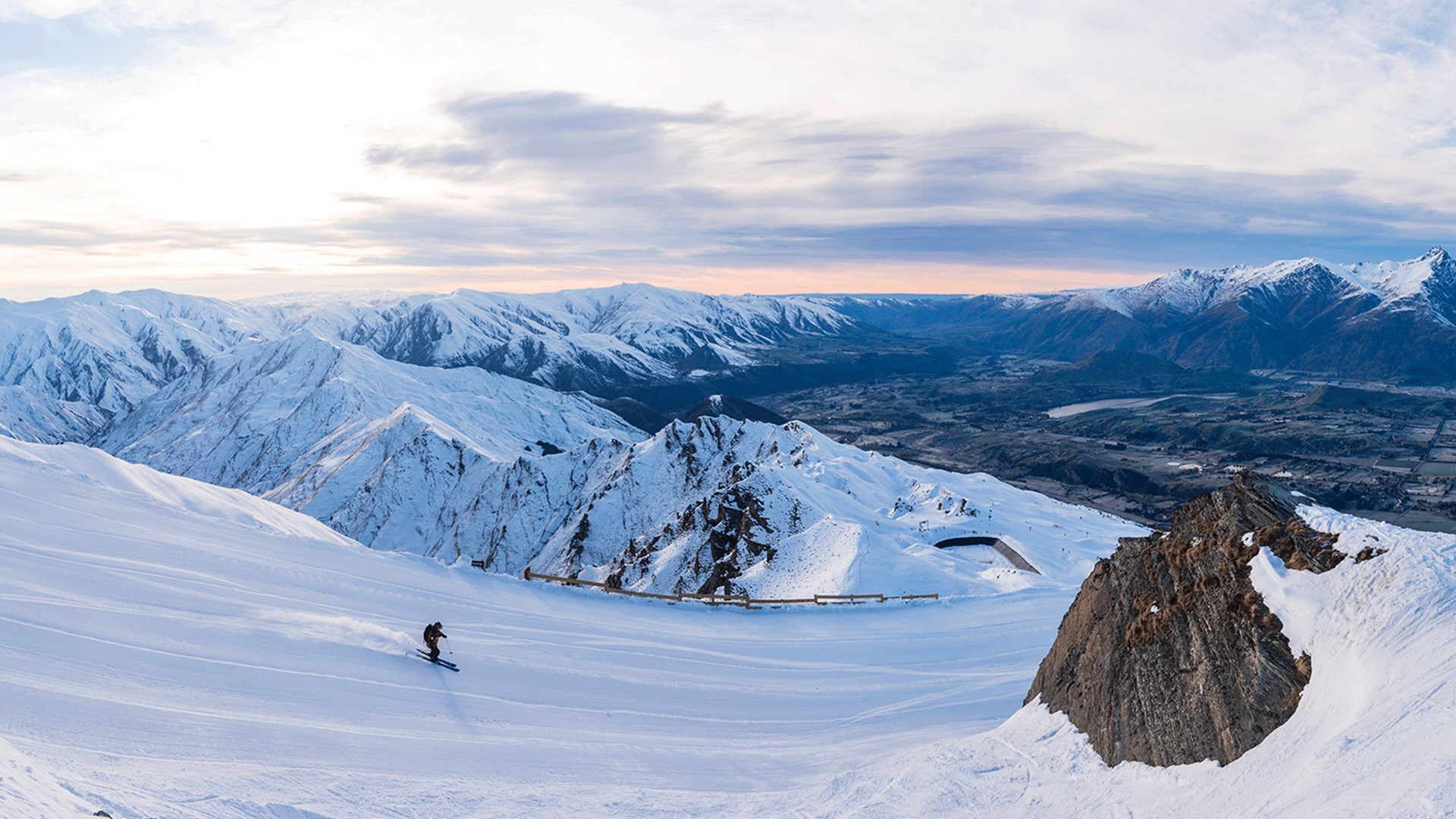
Touring and Backcountry
Wanting to go ski touring at Coronet Peak? Please read our Ski Touring Guidelines and safety tips to ensure a safe and enjoyable experience.
Coronet Peak is a 24 hour, seven days per week operation with multiple natural and operational hazards. Ski touring within the ski area boundary is dangerous and can result in serious injury so please respect all closures.
Ski touring is NOT PERMITTED between 6PM & 4AM. All areas of the mountain are winch groomed on a daily basis with activity concentrated around the M1.
During our winter operational season, Sarah Sue, the western most run on the mountain, is the ONLY designated uphill route.
The highest risks for ski tourers are:
- Disorientation in poor weather or darkness, or skiing/riding leading to exposure.
- Skiing/riding or falling injury leading to exposure (hypothermia).
- Collision with winch groomer cables, skidoos and stationary equipment.
- Winch cables are impossible to see at times, may be buried beneath the snow, can move suddenly and could easily kill you.
- Skidoos take a long time to stop and may not be able to avoid a collision if you are on their path.
- Visibility can be severely limited by factors such as cloud, snow/snowmaking and lights from machinery. Never assume that you have been seen by machinery just because you can see it.
Please follow these safety tips:
- Ski Touring is NOT PERMITTED during the hours of 6pm to 4am during the ski season (1st June to 7th October).
- Don’t go alone; bring a friend, and let someone know when you expect to return and when to call emergency services for help.
- Always carry a cell phone or personal locator beacon for communication.
- Please wear reflective clothing along with a head torch when it is dark, or the visibility is limited due to weather conditions, so the skidoo operators can se you clearly from a distance.
- Uphill traffic must use outside of trails and remain visible from above at all times. Please also keep clear of skidoo and CanAm tracks.
- Please keep off freshly groomed trails when soft.
- Read the avalanche bulletin appropriate to the terrain you intend to access, particularly if going into the back country.
- Coronet Peak does not provide Patrol response when closed, or for incidents outside the ski area. Call 111 for all such emergencies.
- Take responsibility for your own safety and be equipped.
- The Back Bowls are steep Expert Terrain. As such they have an increase in hazard, including avalanche. The Back Bowls may be closed due to Avalanche Hazard Mitigation or inclement weather as these conditions heighten risk in this terrain. Back Bowls are closed at night and assessed for opening daily.
Road Safety:
Driving on snow and ice is very different to driving on dry or even wet roads, especially if you are not familiar with these sorts of conditions. You will be required to fit snow chains if our Road Safety team indicate. Fitting chains can apply to both two-wheel drive (2WD) and four-wheel drive (4WD) vehicles so please ensure you check the Road Status signs at the entry to the Coronet Peak ski area access road.
It is important to know when and how to use chains. You must stop and put on chains when indicated on the ski area access roads; signs will indicate when it is compulsory to use chains, but you may also wish to use chains on very slippery surfaces for extra traction.
Avalanche and Rescue:
Our Coronet Peak Ski Patrol teams are out every day making sure the terrain is safe. Ski Patrol continually observe weather and snow-pack conditions and monitor the snow's increasing or decreasing stability within the ski area throughout the season.
Ski patrol medical teams:
They are also on call to respond to your needs very quickly if an accident or emergency occurs. Search and Rescue (SAR) is most often required outside the ski area boundary and is undertaken by our Coronet Peak Ski Patrol team. The Ski Patrol team has trained for many years to deal with every form of ski area emergency.
If you decide to go skiing or snowboarding in the backcountry at Coronet Peak you need to carry the right safety equipment. Avalanches happen for a reason, so it’s important to choose your terrain wisely.
Please visit the Mountain Safety website for details on requirements to ensure your safe backcountry adventure.
Be Prepared:
It is good practice to alert our Ski Patrol with details of your anticipated backcountry trip. You can pop into our Ski Patrol office at any time. Please be aware that our Ski Patrol do not patrol these areas and only venture here in the case of a known emergency.
We also encourage you to watch the North Face video series below, which explains how to make the right decisions for skiing out of bounds and in the backcountry. There are five videos in the series.
Ski touring information:
Sarah Sue is the only trail open for ski touring at Coronet Peak. A message to those hardy souls who hit the snow before dawn and skin up Sarah Sue, the designated uphill route at Coronet. If you are coming up for an early morning fix there are a number of potentially fatal hazards that you must be aware of.
Please read our ski touring safety tips about how to make your day at Coronet Peak safe and fun.